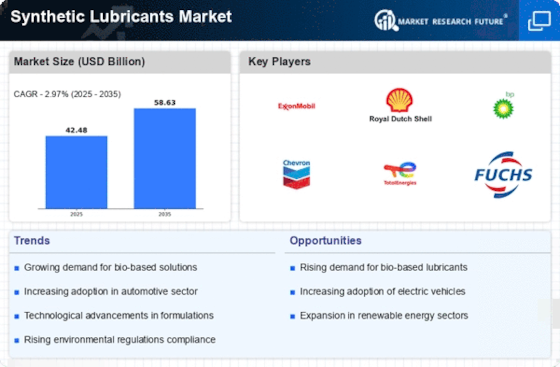Top Industry Leaders in the Synthetic Lubricant Market
 Synthetic lubricants, the high-performance champions of the oil world, reign supreme in engines and machines under demanding conditions. this dynamic market is a complex web of competing giants, innovative niche players, and environmental considerations.
Synthetic lubricants, the high-performance champions of the oil world, reign supreme in engines and machines under demanding conditions. this dynamic market is a complex web of competing giants, innovative niche players, and environmental considerations.
The Grease Kings and their Gears:
Global Powerhouses: Behemoths like ExxonMobil, Shell, and TotalEnergies wield immense power through their vast production capacities, diverse product portfolios, and established presence in high-growth sectors like automotive and industrial lubricants. ExxonMobil, with its Mobil 1 brand, remains a household name for high-performance synthetic oils.
Regional Champions: Companies like Lubrizol Corporation (US) and Bharat Petroleum Corporation Limited (India) excel in specific regions due to their localized expertise, regulatory knowledge, and proximity to key customers. Bharat Petroleum caters to the booming Indian automotive market with its synthetic lubricant offerings.
Niche Innovators: Smaller companies like AMSOIL Inc. (US) and Fuchs Lubricants (Germany) specialize in high-performance, custom-formulated synthetic lubricants for demanding applications like racing engines and industrial machinery. Fuchs Lubricants caters to specialized sectors like steel and mining with its advanced synthetic lubricants.
Strategies that Keep the Engine Purring:
-
Product Diversification: Offering a comprehensive range of synthetic lubricants for various engine types, climates, and operating conditions attracts diverse customers. Shell caters to automotive, motorcycle, and marine sectors with its varied synthetic lubricant offerings.
-
R&D Prowess: Continuous innovation in synthetic base fluids, additive packages, and performance-enhancing technologies is crucial for staying ahead of the curve. TotalEnergies' focus on bio-based and sustainable synthetic lubricants exemplifies this commitment.
-
Brand Building and Marketing: Investing in targeted advertising, sponsorships, and technical partnerships builds brand awareness and trust among targeted customer segments. AMSOIL Inc. leverages its association with racing teams to promote its high-performance lubricants.
-
Cost Optimization: Streamlining production, utilizing recycled materials, and optimizing supply chains are key to maintaining competitive pricing. Bharat Petroleum's efficient production processes and domestic sourcing of raw materials help control costs.
-
Partnerships and Acquisitions: Collaborations with automotive manufacturers, research institutions, and startups can accelerate innovation and market reach. Lubrizol Corporation's partnerships with leading carmakers help them develop lubricants tailored to specific engine technologies.
Factors Dictating Market Share Champions:
-
Booming Automotive Industry: Rising vehicle production and ownership, particularly in emerging economies, fuels demand for high-performance, long-lasting synthetic lubricants. ExxonMobil and Bharat Petroleum stand to benefit from this trend.
-
Increasing Environmental Concerns: Stringent emission regulations and the push for sustainable solutions drive demand for bio-based and biodegradable synthetic lubricants. TotalEnergies and companies offering greener alternatives capitalize on this trend.
-
Industrial Expansion: Growth in sectors like manufacturing, mining, and energy generation fosters demand for specialty synthetic lubricants for extreme conditions. Fuchs Lubricants' expertise in industrial lubricants positions them well for this growth.
Key Companies in the synthetic lubricants market include
- Exxon Mobil Corporation (US)
- Total Lubricants (Europe)
- Chevron Corporation (US)
- Pennzoil (US)
- The DOW Chemical Company (US)
- BP PLC (US)
- Petroliam Nasional Berhad (Malaysia)
- Fuchs Petolub SE (Germany)
- Demitsu Kosan Co.Ltd (Japan)
- Lubrizol Corporation (US) among others
Recent Developments:
In 2023, Shell, the world leader in finished lubricants, will introduce Shell Helix HX6 5W-30 and Shell Helix SUV 5W-30, a new line of synthetic BS-VI compliant engine oils in India. They are intended to provide improved engine protection, fuel efficiency, and longer engine life for the passenger car motor oil (PCMO) market.
Shell announced in February that they would be providing carbon-neutral lubricants for passenger cars, heavy-duty diesel engines, and industrial applications, including mining. Shell aims to offset over 200 million liters of advanced synthetic lubricants every year, a move expected to compensate around seven hundred thousand tonnes of CO2 equivalent emissions per annum (equivalent to taking approximately three hundred and forty thousand cars off the road for a year). This represents a significant milestone in Shell Lubricants’ years-long plan geared towards helping customers manage their sustainability needs as well as lowering its products’ carbon footprint through emission avoidance, reduction, and sequestration.










